Fleurs du Mal Magazine


Or see the index
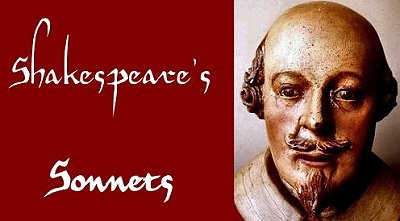
William Shakespeare
(1564-1616)
THE SONNETS
Sonnet 103
Alack what poverty my muse brings forth,
That having such a scope to show her pride,
The argument all bare is of more worth
Than when it hath my added praise beside.
O blame me not if I no more can write!
Look in your glass and there appears a face,
That over-goes my blunt invention quite,
Dulling my lines, and doing me disgrace.
Were it not sinful then striving to mend,
To mar the subject that before was well?
For to no other pass my verses tend,
Than of your graces and your gifts to tell.
And more, much more than in my verse can sit,
Your own glass shows you, when you look in it.
Sonnet 103
Ach, hoe armoedig wat mijn muze maakt,
Want met zo’n ruimte toch voor trots vertoon,
Zit er meer waarde in het thema naakt
Dan met mijn lof bekleed als extra loon.
O laak mij niet als ‘t schrijven niet meer komt!
Kijk in uw spiegel en zie daar ‘t gezicht
Zo schoon dat mijn talent is afgestompt,
En ik veracht wordt voor mijn botte dicht.
Was het geen zonde^als ik herstel beoog,
Maar ‘t voorwerp, eerder nog zo gaaf, dan breek?
Want geen bedoeling heeft mijn vers vertoog
Dan dat ‘k uw statie en talent bespreek.
En meer, veel meer, dan uit mijn verzen blijkt,
Toont u uw spiegel, als u er in kijkt.
Vertaling Cornelis W. Schoneveld
(November 2011)
kempis.nl poetry magazine
More in: -Shakespeare Sonnets, Shakespeare
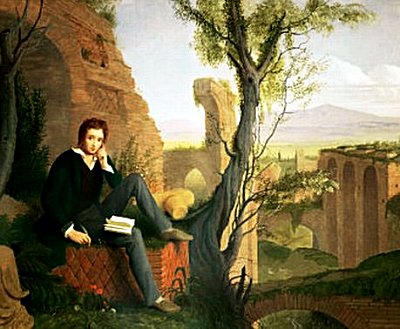
Percy Byssche Shelley
(1792-1822)
To Night
Swiftly walk o’er the western wave,
Spirit of Night!
Out of the misty eastern cave,
Where, all the long and lone daylight,
Thou wovest dreams of joy and fear,
Which make thee terrible and dear, –
Swift be thy flight!
Wrap thy form in a mantle grey,
Star-inwrought!
Blind with thine hair the eyes of Day;
Kiss her until she be wearied out –
Then wander o’er city, and sea, and land,
Touching all with thine opiate wand –
Come, long-sought!
When I arose and saw the dawn,
I sighed for thee;
When light rode high, and the dew was gone,
And noon lay heavy on flower and tree,
And the weary Day turned to his rest,
Lingering like an unloved guest,
I sighed for thee.
Thy brother Death came, and cried,
Wouldst thou me?
Thy sweet child Sleep, the filmy-eyed,
Murmured like a noontide bee,
Shall I nestle near thy side?
Wouldst thou me? – And I replied,
No, not thee!
Death will come when thou art dead,
Soon, too soon –
Sleep will come when thou art fled;
Of neither would I ask the boon
I ask of thee belovèd Night –
Swift be thine approaching flight,
Come soon, soon!
1821
Percy Byssche Shelley
Aan de nacht
Jaag snel over de westgolf voort,
Geest van de Nacht!
Uit de mistgrot van ‘t oosters oord,
Waar, ‘t daglicht lang, jij eenzaam wacht,
En bange en blije dromen weeft,
Wat angst, en vriendschap, voor je geeft, –
Snel zij je jacht!
Neem ‘n mantel, grijs, met sterbeslag,
Sla hem om!
Blinddoek met j’ haardos eerst de Dag;
Kus haar dan moe, weerom en weerom –
Ga daarna stad, en land, en zeeën af,
‘t Al rakend met je opiumstaf –
Gezochte, kom!
Toen de ochtend gloorde voor mijn oog,
Gold jou mijn zucht;
Toen dauw weg was, en het daglicht hoog,
Toen ‘t groen leed door de middaglucht,
En toen moe de Dag zocht naar zijn rust,
Dralend als ‘n gast, lang weggekust,
Gold jou mijn zucht.
Je broer de Dood kwam, en vroeg,
“Zocht je mij?”
Je zoet kind Slaap, die ‘n oogfloers droeg,
Gonsde als een middagbij:
“Wou jij dat ik naast je sliep?
Zocht je mij?” – Waarop ik riep,
“Weg hier, jij!”
Dood komt na jouw laatste zucht,
Gauw, te gauw –
Slaap komt als jij bent gevlucht;
De gunst die ik nu vraag van jou
Vraag ik hun niet, geliefde Nacht –
Eindig hier gezwind je jacht,
Kom gauw, gauw!
Vertaling Cornelis W. Schoneveld
Uit: Bestorm mijn hart, de beste Engelse gedichten uit de 16e-19e eeuw gekozen en vertaald door Cornelis W. Schoneveld, tweetalige editie. Rainbow Essentials no. 55, Uitgeverij Maarten Muntinga, Amsterdam, 2008, 296 pp, € 9,95 ISBN: 9789041740588
Kempis.nl poetry magazine
More in: Archive S-T, Percy Byssche Shelley, Shelley, Shelley, Percy Byssche

William Shakespeare
(1564-1616)
THE SONNETS
Sonnet 102
My love is strengthened though more weak in seeming,
I love not less, though less the show appear,
That love is merchandized, whose rich esteeming,
The owner’s tongue doth publish every where.
Our love was new, and then but in the spring,
When I was wont to greet it with my lays,
As Philomel in summer’s front doth sing,
And stops her pipe in growth of riper days:
Not that the summer is less pleasant now
Than when her mournful hymns did hush the night,
But that wild music burthens every bough,
And sweets grown common lose their dear delight.
Therefore like her, I sometime hold my tongue:
Because I would not dull you with my song.
Sonnet 102
Mijn liefde is versterkt, maar minder zichtbaar,
Niet zwakker, minder slechts geproclameerd;
Díe rijk geschatte liefde is koopwaar
Die de bezitter overal adverteert.
Liefde was nieuw voor ons, pas voorjaar toen,
En ik kon steeds haar in mijn zangen kwijt,
Zoals nachtegalen tot de zomer doen,
En stoppen bij de groei van rijper tijd.
Niet dat de zomer minder nog pleziert
Dan toen haar klaaggezang de nacht bedwong,
Maar dat muzieklawaai door ‘t bos heen giert,
En teveel zoetheid streelt niet meer de tong.
Dus net als zij doet, zwijg ik nu soms stil:
Want jou vervelen is wat ik niet wil.
Vertaling Cornelis W. Schoneveld
(Oktober 2011)
kempis.nl poetry magazine
More in: -Shakespeare Sonnets, Shakespeare
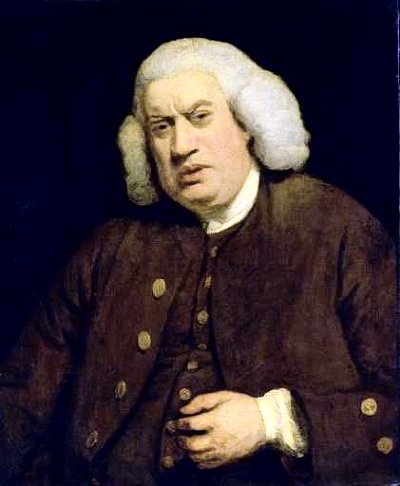
Samuel Johnson
(1709-1784)
On the Death of Dr. Robert Levet,
A Practiser of Physic
Condemned to hope’s delusive mine,
As on we toil from day to day,
By sudden blast, or slow decline,
Our social comforts drop away.
Well tried through many a varying year,
See Levet to the grave descend;
Officious, innocent, sincere,
Of every friendless name the friend.
Yet still he fills affection’s eye,
Obscurely wise, and coarsely kind;
Nor, lettered arrogance, deny
Thy praise to merit unrefined.
When fainting nature called for aid,
And hovering death prepared the blow,
His vig’rous remedy displayed
The power of art without the show.
In misery’s darkest caverns known,
His useful care was ever nigh,
Where hopeless anguish poured his groan,
And lonely want retired to die.
No summons mocked by chill delay,
No petty gain disdained by pride,
The modest wants of every day
The toil of every day supplied.
His virtues walked their narrow round,
Nor made a pause, nor left a void;
And sure th’ Eternal Master found
The single talent well employed.
The busy day, the peaceful night,
Unfelt, uncounted, glided by;
His frame was firm, his powers were bright,
Tho’now his eightieth year was nigh.
Then with no throbbing fiery pain,
No cold gradations of decay,
Death broke at once the vital chain,
And freed his soul the nearest way.
1782
Samuel Johnson
Op de dood van Dr Robert Levet,
Een beoefenaar der geneeskunst
Gedoemd door hoop die leidt tot waan,
In dagelijkse zwoegernij,
Gaat ons eensklaps, of langzaam aan,
‘t Gerief van samenzijn voorbij.
Na vele jaren, goed en slecht,
Daalt Levet, zeer beproefd, in ‘t graf –
Die ijverig, argeloos, oprecht,
Elk eenzaam mens zijn vriendschap gaf.
Nog zien we ‘m met genegenheid,
Ruig minzaam, en verborgen wijs;
Gij die geleerd maar waanwijs zijt,
Stel toch zijn ruw talent op prijs!
Als ‘n zwak gestel zijn hulp verzocht,
Met ‘t toeslaan van de dood nabij,
Dan bleek uit wat zijn hand vermocht
De kracht der kunst, van opsmuk vrij.
In donkere grotten van het leed
Was steeds zijn goede zorg in trek,
Ook bij de hopeloze smartekreet,
En ‘t eenzaam sterven door gebrek.
Geen taak met uitstel kil bespot,
Geen klein gewin door trots veracht,
Maar dagelijks werd de sobere pot
Uit ‘t dagelijks zwoegen opgebracht.
Zijn deugd liep in zijn smalle sfeer,
Zonder gedraal, zonder belet,
En zeker zag de Eeuw’ge Heer
‘t Ene talent goed ingezet.
De drukke dag, de kalme nacht,
Vloeide ongeteld en ongewaar;
Zijn bouw was sterk, vol levenskracht,
Al was hij nu haast tachtig jaar.
Dan, zonder kloppend hete koorts
Of kil verval in zware tijd,
Doofde ineens de levens-toorts,
En werd zijn ziel rechtstreeks bevrijd.
Vertaling Cornelis W. Schoneveld
Uit: Bestorm mijn hart, de beste Engelse gedichten uit de 16e-19e eeuw gekozen en vertaald door Cornelis W. Schoneveld, tweetalige editie. Rainbow Essentials no. 55, Uitgeverij Maarten Muntinga, Amsterdam, 2008, 296 pp, € 9,95 ISBN: 9789041740588
Kempis.nl poetry magazine
More in: Archive I-J, More translations
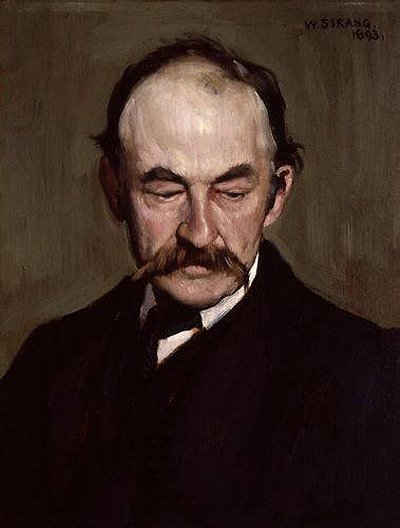
Thomas Hardy
(1840-1928)
Neutral Tones
We stood by a pond that winter day,
And the sun was white, as though chidden of God,
And a few leaves lay on the starving sod;
– They had fallen from an ash, and were gray;
Your eyes on me were as eyes that rove
Over tedious riddles of years ago;
And some words played between us to and fro
On which lost the more by our love.
The smile on your mouth was the deadest thing
Alive enough to have strength to die;
And a grin of bitterness swept thereby
Like an ominous bird a-wing…
Since then, keen lessons that love deceives,
And wrings with wrong, have shaped to me
Your face, and the God-curst sun, and a tree,
And a pond edged with grayish leaves.
1867
Thomas Hardy
Neutrale tinten
We stonden bij ‘n plas in winterse kou,
En de zon, zo wit, leek verstoten door God,
En wat blad lag op ‘t gras, halfverrot;
– Het kwam van een es, en was grauw;
Jouw blik op mij was als ‘n blik die dwaalt
Over saaie raadsels al jaren voorbij;
En wat taal speelde er tussen jou en mij
Over wíens liefde ‘t meest had gefaald.
De lach om je mond was het doodste ding
Nog levend genoeg voor ‘n gang naar ‘t graf;
En een bittere grijns schoot er vanaf,
Alsof ‘n vogel in doemvlucht ging…
Sindsdien, biedt ‘t feit dat liefde misleidt,
Verstrikt met kwaad, mij de bittere les
Van je blik, en ‘n Godloze zon, en ‘n es
En ‘n plas, en wat grijs blad verspreid.
Vertaling Cornelis W. Schoneveld
Uit: Bestorm mijn hart, de beste Engelse gedichten uit de 16e-19e eeuw gekozen en vertaald door Cornelis W. Schoneveld, tweetalige editie. Rainbow Essentials no. 55, Uitgeverij Maarten Muntinga, Amsterdam, 2008, 296 pp, € 9,95 ISBN: 9789041740588
kempis.nl poetry magazine
More in: Archive G-H, Hardy, Thomas, More translations

George Gordon, Lord Byron
(1788-1824)
She Walks in Beauty
She walks in beauty, like the night
Of cloudless climes and starry skies;
And all that’s best of dark and bright
Meet in her aspect and her eyes:
Thus mellowed to that tender light
Which heaven to gaudy day denies.
One shade the more, one ray the less,
Had half impaired the nameless grace
Which waves in every raven tress,
Or softly lightens o’er her face;
Where thoughts serenely sweet express
How pure, how dear their dwelling-place.
And on that cheek, and o’er that brow,
So soft, so calm, yet eloquent,
The smiles that win, the tints that glow,
But tell of days in goodness spent,
A mind at peace with all below,
A heart whose love is innocent!
1814
George Gordon, Lord Byron
Zij schrijdt in schoonheid
Zij schrijdt in schoonheid, als de nacht
In ‘n wolk-vrij, sterren-rijk gewaad;*
En donker mengt met licht zijn pracht
In haar verschijning en gelaat:
Tot ‘n hemels tere glans verzacht
Waarin schel daglicht overgaat.
Eén schaduw meer, één straal verhuld,
Had half de vreemde charme ontwricht
Die raafzwart door haar lokken krult,
Of lieflijk glanst in haar gezicht;
Met ‘n vredig oordeel, zoet vervuld
Van ‘t zuiverst goed dat in haar ligt.
En dan die wang, die blik die boeit,
Zo kalm, toch met welsprekendheid;
De lach die inneemt, kleur die gloeit,
Maar ‘n leven toont in deugd geleid;
Een geest die hier in vrede groeit,
Een hart waar liefde puur gedijt!
* Byron beschrijft hier (de ongeveer 35 jaar oude) Anne Beatrix Horton, sedert 1806 gehuwd met Byron’s neef Sir Robert John Wilmot. Hij ontmoette haar op een bal in London in juni 1814. Zij was gekleed in een glinsterend zwart rouwgewaad (haar moeder was op 23 mei overleden). Byron schreef het gedicht daags na de ontmoeting. De National Portrait Gallery bezit een (zwart gelokt) portret van haar.
Vertaling Cornelis W. Schoneveld
Uit: Bestorm mijn hart, de beste Engelse gedichten uit de 16e-19e eeuw gekozen en vertaald door Cornelis W. Schoneveld, tweetalige editie. Rainbow Essentials no. 55, Uitgeverij Maarten Muntinga, Amsterdam, 2008, 296 pp, € 9,95 ISBN: 9789041740588
Kempis.nl poetry magazine
More in: Archive A-B, Byron, Byron, Lord
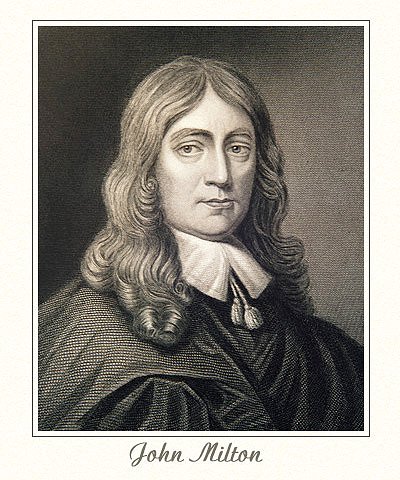
John Milton
(1608-1674)
At a Solemn Music
Blest pair of sirens, pledges of heaven’s joy,
Sphere-born, harmonious sisters, Voice and Verse,
Wed your divine sounds, and mixed power employ,
Dead things with inbreathed sense able to pierce;
And to our high-raised phantasy present
That undisturbed song of pure consent,
Ay sung before the sapphire-coloured throne
To Him that sits thereon,
With saintly shout, and solemn jubilee;
Where the bright seraphim, in burning row,
Their loud uplifted angel-trumpets blow;
And the cherubic host, in thousand choirs,
Touch their immortal harps of golden wires,
With those just spirits that wear victorious palms,
Hymns devout and holy psalms
Singing everlastingly;
That we on earth, with undiscording voice,
May rightly answer that melodious noise;
As once we did, till disproportioned sin
Jarred against nature’s chime, and with harsh din
Broke the fair music that all creatures made
To their great Lord, whose love their motion swayed
In perfect diapason, whilst they stood
In first obedience, and their state of good.
Oh, may we soon again renew that song,
And keep in tune with heaven, till God ere long,
To His celestial concert us unite,
To live with Him, and sing in endless morn of light!
1645
John Milton
Bij gewijde muziek
Brengers der hemelvreugd ons toegedacht,
Zusters der sferen, Zang en Poëzie,
Meng uw sirenenklank, versmelt uw kracht,
Dooradem dode stof met harmonie;
Geef onze hooggespannen fantasie
Die welgestemde, pure melodie,
Hem ongestoord gebracht, op zuivere toon,
Voor Zijn saffieren troon,
Met vroom gejuich en opgetogenheid;
Waar vurig rood de serafijnenstoet
Haar opgestoken hoorn luid schallen doet;
En ’t cherubijnenkoor, in duizendvoud,
De eeuwige harp bespeelt, besnaard in goud;
Waar zalige geesten bij hun zegepalm,
Heilige zang en vrome psalm
Zingen tot in eeuwigheid;
Opdat van wanklank vrij, ons aardse lied
Aan die welluidendheid recht weerklank biedt,
Zoâls ooit; tot onze mateloze schuld
d’ Natuur met dissonanten had gevuld
En de muziek der schepsels ruw verstoord,
Die steeds door d’ Allerhoogste was gehoord,
Wiens liefde hun klankenpracht was toegewijd
In de eerste staat van deugd en volgzaamheid.
Oh, zingen wij weldra opnieuw die zang,
Wijshoudend met de hemel, tot eerlang
God ons verenigt met zijn engelenkoor,
Bij Hem, voor zang in eindeloze ochtendgloor!
Vertaling Cornelis W. Schoneveld
Uit: Bestorm mijn hart, de beste Engelse gedichten uit de 16e-19e eeuw gekozen en vertaald door Cornelis W. Schoneveld, tweetalige editie. Rainbow Essentials no. 55, Uitgeverij Maarten Muntinga, Amsterdam, 2008, 296 pp, € 9,95 ISBN: 9789041740588
Kempis.nl poetry magazine
More in: Archive M-N, Milton, John, More translations
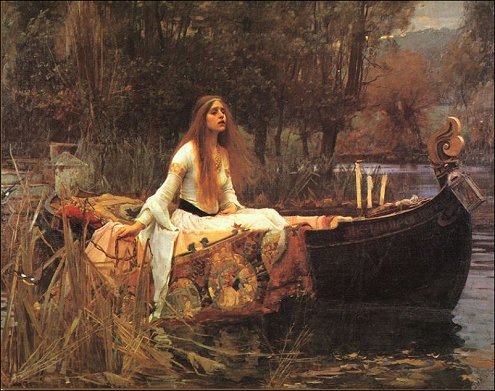
J.W. Waterhouse: The lady of Shalott (1888)
Alfred Lord Tennyson
(1809-1892)
The Lady Of Shalott
I
On either side the river lie
Long fields of barley and of rye,
That clothe the wold and meet the sky;
And through the field the road runs by
To many-tower’d Camelot;
And up and down the people go,
Gazing where the lilies blow
Round an island there below,
The island of Shalott.
Willows whiten, aspens quiver,
Little breezes dusk and shiver
Through the wave that runs for ever
By the island in the river
Flowing down to Camelot.
Four grey walls, and four grey towers,
Overlook a space of flowers,
And the silent isle embowers
The Lady of Shalott.
By the margin, willow-veil’d,
Slide the heavy barges trail’d
By slow horses; and unhailed
The shallop flitteth, silken-sail’d
Skimming down to Camelot
Yet who hath seen her wave her hand?
Or at the casement seen her stand?
Or is she know in all the land,
The Lady of Shalott?
Only reapers, reaping early,
In among the beared barley
Hear a song that echoes cheerly
From the river winding clearly,
Down to towered Camelot:
And by the moon the reaper weary,
Piling sheaves in uplands airy,
Listening, whispers, ” ‘Tis the fairy
Lady of Shalott.”
II
There she weaves by night and day
A magic web with colours gay.
She has heard a whisper say,
A curse is on her if she stay
To look down to Camelot.
She knows not what the curse may be,
And so she weaveth steadily,
And little other care hath she,
The Lady of Shalott.
And moving through a mirror clear
That hangs before her all the year,
Shadows of the world appear.
There she sees the highway near
Winding down to Camelot;
There the river eddy whirls,
And there the surly village churls,
And the red cloaks of market girls
Pass onward from Shalott.
Sometimes a troop of damsels glad,
An abbot on an ambling pad,
Sometimes a curly shepherd lad,
Or long-hair’d page in crimson clad,
Goes by to tower’d Camelot;
And sometimes through the mirror blue
The knights come riding two and two:
She hath no loyal knight and true,
The Lady of Shalott.
But in her web she still delights
To weave the mirror’s magic sights,
For often through the silent nights
A funeral, with plumes and lights
And music, went to Camelot:
Or when the Moon was overhead,
Came two young lovers lately wed;
“I am half sick of shadows,” said
The Lady of Shalott.
III
A bow-shot from her bower-eaves,
He rode between the barley sheaves,
The sun came dazzling thro’ the leaves,
And flamed upon the brazen greaves
Of bold Sir Lancelot.
A red-cross knight for ever kneeled
To a lady in his shield,
That sparkled on the yellow field,
Beside remote Shalott.
The gemmy bridle glitter’d free,
Like to some branch of stars we see
Hung in the golden Galaxy.
The bridle bells rang merrily
As he rode down to Camelot:
And from his blazon’d baldric slung
A mighty silver bugle hung,
And as he rode his armor rung
Beside remote Shalott.
All in the blue unclouded weather
Thick-jewell’d shone the saddle-leather,
The helmet and the helmet-feather
Burn’d like one burning flame together,
As he rode down to Camelot.
As often thro’ the purple night,
Below the starry clusters bright,
Some bearded meteor, trailing light,
Moves over still Shalott.
His broad clear brow in sunlight glow’d;
On burnish’d hooves his war-horse trode;
From underneath his helmet flow’d
His coal-black curls as on he rode,
As he rode down to Camelot.
From the bank and from the river
He flashed into the crystal mirror,
“Tirra lirra,” by the river
Sang Sir Lancelot.
She left the web, she left the loom,
She made three paces through the room,
She saw the water-lily bloom,
She saw the helmet and the plume,
She look’d down to Camelot.
Out flew the web and floated wide;
The mirror crack’d from side to side;
“The curse is come upon me,” cried
The Lady of Shalott.
IV
In the stormy east-wind straining,
The pale yellow woods were waning,
The broad stream in his banks complaining.
Heavily the low sky raining
Over tower’d Camelot;
Down she came and found a boat
Beneath a willow left afloat,
And around about the prow she wrote
The Lady of Shalott.
And down the river’s dim expanse
Like some bold seer in a trance,
Seeing all his own mischance —
With a glassy countenance
Did she look to Camelot.
And at the closing of the day
She loosed the chain, and down she lay;
The broad stream bore her far away,
The Lady of Shalott.
Lying, robed in snowy white
That loosely flew to left and right —
The leaves upon her falling light —
Thro’ the noises of the night,
She floated down to Camelot:
And as the boat-head wound along
The willowy hills and fields among,
They heard her singing her last song,
The Lady of Shalott.
Heard a carol, mournful, holy,
Chanted loudly, chanted lowly,
Till her blood was frozen slowly,
And her eyes were darkened wholly,
Turn’d to tower’d Camelot.
For ere she reach’d upon the tide
The first house by the water-side,
Singing in her song she died,
The Lady of Shalott.
Under tower and balcony,
By garden-wall and gallery,
A gleaming shape she floated by,
Dead-pale between the houses high,
Silent into Camelot.
Out upon the wharfs they came,
Knight and burgher, lord and dame,
And around the prow they read her name,
The Lady of Shalott.
Who is this? And what is here?
And in the lighted palace near
Died the sound of royal cheer;
And they crossed themselves for fear,
All the Knights at Camelot;
But Lancelot mused a little space
He said, “She has a lovely face;
God in his mercy lend her grace,
The Lady of Shalott.”
Alfred Lord Tennyson
De Jonkvrouw van Shalot
DEEL I
1
Langs beide waterkanten staan
De velden vol met rijpend graan;
Zij kleden land en luchten aan,
En dwars erdoor slingert een laan
Naar ‘t torenrijke Camelot;
En mensen trekken heen en weer;
Zij blikken in bewondering neer
Op ‘t eiland daar met lelies teer,
Het eiland van Shalot.
2
Door de briesjes meegenomen
Trilt het blad van espenbomen,
En de golven gaan en komen
Als ze langs het eiland stromen
Op hun weg naar Camelot.
Tussen grijze torenmuren,
Waartegen vele bloemen schuren,
Zit de stilte te verduren
De Jonkvrouw van Shalot.
3
Aan de oever wilgbeplant
Trekt het paard traag langs de kant
Een zware bark; ver van de rand
Zeilt er een sloep met zijden want
Voor de wind naar Camelot:
Wie zag haar wuiven met haar hand?
Of staan nabij de vensterrand?
En kent men haar wel in het land,
De Jonkvrouw van Shalot?
4
Slechts de maaier van het koren
Kan in ‘t vroege ochtendgloren
Helder klinkend zingen horen
Echoënd vanaf de toren,
Naar het transrijk Camelot:
En als hij moe en traag in ‘t maanlicht
In de akker schoven opricht,
Luistert hij en zegt: “dit elf-wicht
Is jonkvrouw van Shalot.”
DEEL II
5
Binnen weeft zij, dag en nacht,
Een magisch web vol kleurenpracht.
Eens zei daar een stem haar zacht,
Dat haar een vloek treft als zij dacht
Uit te zien naar Camelot.
De aard der vloek werd niet gehoord,
Dus weeft zij steeds gestadig voort,
Door weinig andere zorg verstoord,
De Jonkvrouw van Shalot.
6
En in een heldere spiegel daar
Die voor haar hangt door ‘t hele jaar,
Vertoont in schaduw zich aan haar
De wereld, en maakt haar gewaar
De weg die leidt naar Camelot:
Kolkend loost de stroom zijn last,
En kerels, boers, onaangepast,
En marketentsters, roodgejast,
Gaan langs vanuit Shalot.
7
Soms ook meisjes blij van aard,
Een abt traag sjokkend op zijn paard,
Een herdersknecht met krullenbaard,
Een page in ‘t rood en lang gehaard,
Gaan daar voorbij naar Camelot;
Soms ziet zij in haar spiegelbaan
Edelen te paard getweeën gaan;
Trouw bood geen ridder haar ooit aan,
De Jonkvrouw van Shalot.
8
Maar in haar web weeft zij nog blij
Een spiegelbeeld, al ging ‘t voorbij,
Want vaak trok ‘s nachts in ‘t stil getij
Een lijkstoet langs, in lichte rij
En met muziek, naar Camelot;
Maar eens bij nacht en heldere maan,
Kwam er een jeugdig bruidspaar aan:
Toen sprak, “Door schaduw ben ‘k ontdaan,”
De Jonkvrouw van Shalot.
DEEL III
9
Een pijlschot af van waar zij was
Bij ‘t raam, reed hij door graan en vlas;
Fel scheen de zon door het gewas,
En vlamde op ‘t brons van het kuras
Van dappere Heer Lancelot.
Een kruistochtridder lag geknield
Voor ‘n jonkvrouw op zijn schild,
Dat straalde als hij ‘t voor zich hield,
Ver weg daar bij Shalot.
10
De leidselparels blonken vrij
Als sterren die zich voegen bij
De gouden straal der Melkweg rij.
De teugelbellen luidden blij,
Terwijl hij reed naar Camelot.
En van zijn schouderband en flank
Hing een signaalhoorn zilverblank;
Te paard, weerklonk de harnasklank,
Ver weg daar bij Shalot.
11
En in het wolkvrij blauwe weer
Glom sieraadrijk het zadelleer,
Met fraaie helm,en helmenveer
Gedrieën vlammend eens te meer,
Terwijl hij reed naar Camelot.
Zoals zo vaak bij purperen nacht,
Een luchtsteen, die in sterrenpracht
Gehuld, een lichtstaart met zich bracht,
Schiet over stil Shalot.
12
De zon beschijnt zijn stoer gelaat;
De strijdros hoef flitst in de maat;
Zwart krullend haar in overdaad
Ontsnapt zijn helm, als hij daar gaat
De heirweg af naar Camelot.
In de spiegel, via ‘t water,
Ontstonden flitsen en geklater,
Want: “Latiere-liere-later”
Zong Heer Lancelot.
13
Ze spon en weefde nu niet meer,
Ze trad naar ‘t raam, en keek daar neer,
Ze zag de waterlelies teer,
Ze zag de helm en helmenveer,
Zij keek uit naar Camelot.
Weg vloog het web, en dreef ver heen;
De spiegel spatte plots uiteen;
“De vloek is hier,” kreet in geween
De Jonkvrouw van Shalot.
DEEL IV
14
In de Ooster stormwind zwaaiend
Taande ‘t bleke woud verwaaiend,
Klaagde ‘t water heftig draaiend,
Sloeg de regen onrust zaaiend
Neer op ‘t transrijk Camelot;
Zij daalde af en vond een boot
Aan ‘n wilg bevestigd met zijn schoot,
En om de boeg heen schreef zij groot:
“De Jonkvrouw van Shalot”.
15
En langs het schimmig watervlak –
Gelijk een visionair, in zak
En as, toen voorspoed hem ontbrak-
Wierp zij met oog verglaasd en strak
Blikken richting Camelot.
De avond eenmaal ingeluid,
Viert zij de schoot, en strekt zich uit,
Dan drijft zij weg door niets gestuit,
De Jonkvrouw van Shalot.
16
Liggend, in sneeuwwitte dracht
Los zwevend, en op niets verdacht –
Bladeren haar rakend licht en zacht –
Dreef zij door klanken van de nacht
Het water af naar Camelot:
Terwijl de boot zich leiden liet
Langs wilgenveld en berggebied,
Zong nog haar allerlaatste lied
De Jonkvrouw van Shalot.
17
Verzen klonken, vroom en klagend,
Schallend soms, vaak niet ver dragend,
Tot, haar hartslag zich vertragend,
En in haar oog het licht vervagend,
Zij verscheen in Camelot.
Bij ‘t eerste huis waar in ‘t getij
Zij aankwam aan de kade-zij,
Stierf, haar zingen nu voorbij,
De Jonkvrouw van Shalot.
18
Langs tuin- en torenmuur van steen,
Balkon na galerij, aaneen,
Dreef zij zo, als een schim, alleen
En lijkbleek, langs de huizen heen,
Doodstil binnen Camelot.
Naar de kade kwam al gauw,
Ridder, burger, heer en vrouw;
Zij lazen daar voorop de schouw:
“De Jonkvrouw van Shalot”.
19
Wie is zij toch? Wat is dat hier?
En in het slot vol van vertier
Verstomde ‘t koninklijk plezier;
En kruisen sloeg, eer bang dan fier,
Het ridderdom van Camelot.
Maar Lancelot was niet ontwricht:
Hij zei, “Zij heeft een mooi gezicht;
God lone haar in zijn gericht,
De Jonkvrouw van Shalot.”
Vertaling Cornelis W. Schoneveld
Opgenomen in: Klankrijk en vol furie, 27 verhalende en beschouwende Engelse gedichten uit de 16e -19e eeuw.
Vertaald en toegelicht door Cornelis W. Schoneveld, Boekwinkeltjes-reeks, Assen
www.boekwinkeltjes.nl/reeks – ISBN 9789087480004 / NUR 306
Alfred Lord Tennyson: The Lady Of Shalott (1842 Version)
kempis.nl poetry magazine
More in: Archive S-T, Tennyson, Tennyson, Alfred Lord
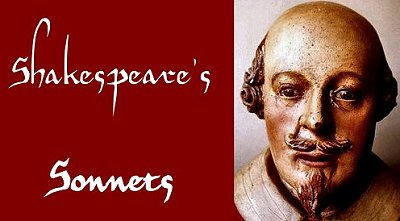
William Shakespeare
Sonnet 94
They that have power to hurt, and will do none,
That do not do the thing, they most do show,
Who moving others, are themselves as stone,
Unmoved, cold, and to temptation slow:
They rightly do inherit heaven’s graces,
And husband nature’s riches from expense,
They are the lords and owners of their faces,
Others, but stewards of their excellence:
The summer’s flower is to the summer sweet,
Though to it self, it only live and die,
But if that flower with base infection meet,
The basest weed outbraves his dignity:
For sweetest things turn sourest by their deeds,
Lilies that fester, smell far worse than weeds.
Sonnet 94
Wie macht heeft pijn te doen, maar dat niet wil,
En afziet van de daad die hij het meeste toont,
Wie anderen roert, zelf als een steen zo stil,
En koud, en van verzoekingen verschoond:
Die zal met recht in hemelvreugd verkeren,
Is zuinig met de gaven der natuur,
Die heeft de macht zijn aanschijn te beheren;
Elk ander houdt zijn schatten maar in huur:
De zomerbloem is voor de zomer zoet,
Al leeft en sterft zij slechts naar eigen smaak,
Maar heeft die bloem een lage smet ontmoet,
Neemt ‘t laagste onkruid op haar waarde wraak:
Want ‘t zoetst, verworden, wacht het zuurste lot,
Erger dan onkruid stinkt de roos die rot.
Nieuwe vertaling Cornelis W. Schoneveld
kempis.nl poetry magazine
More in: Shakespeare

William Shakespeare: Sonnet 89
nieuwe vertaling Cornelis W. Schoneveld
Sonnet 89
Say that thou didst forsake me for some fault,
And I will comment upon that offence;
Speak of my lameness, and I straight will halt,
Against thy reasons making no defence.
Thou canst not (love) disgrace me half so ill,
To set a form upon desired change,
As I’ll my self disgrace; knowing thy will
I will acquaintance strangle and look strange,
Be absent from thy walks, and in my tongue
Thy sweet beloved name no more shall dwell,
Lest I (too much profane) should do it wrong
And haply of our old acquaintance tell.
For thee, against my self I’ll vow debate,
For I must ne’er love him whom thou dost hate.
Sonnet 89
Stel dat vanwege een fout jij mij ontkomt,
Dan meet ik mijn tekortkoming breed uit;
Noem je mijn kreupel, wel dan hink ik prompt
Bij jouw kritiek, die op geen weerstand stuit.
Mijn lief, jij kwetst mij nog niet half zo wreed
Met formuleren wat je anders wil,
Als waarmee ìk mij kwets; als ik het weet,
Dan smoor ik onze vriendschap en kijk kil,
Ontwijk je wandelpad, en op mijn tong
Ligt dan niet meer bemind je zoete naam,
Dat ik die niet onteerde en vals bezong,
En mogelijk onze vriendschap oud beaam.
Debat beloof ik dan met mij, voor jou,
Want ‘k mag nooit minnen wie jij haten zou.
Cornelis W. Schoneveld poetry in translation
kempis.nl poetry magazine
More in: -Shakespeare Sonnets, Shakespeare
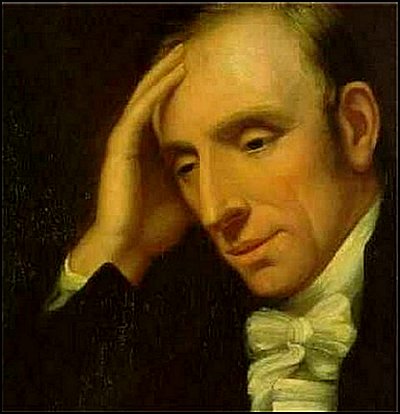
William Wordsworth
(1770-1850)
Composed upon Westminster Bridge
Earth has not anything to show more fair:
Dull would he be of soul who could pass by
A sight so touching in its majesty:
This City now doth, like a garment, wear
The beauty of the morning; silent, bare,
Ships, towers, domes, theatres, and temples lie
Open unto the fields, and to the sky;
All bright and glittering in the smokeless air.
Never did sun more beautifully steep
In his first splendour, valley, rock, or hill;
Ne’er saw I, never felt, a calm so deep!
The river glideth at his own sweet will:
Dear God! the very houses seem asleep;
And all that mighty heart is lying still!
1802
Gedicht op de Westminster brug
De wereld kan niets tonen van meer pracht:
Dom zou de ziel zijn die geen aandacht wijdt
Aan zoiets roerendst in zijn majesteit:
De Stad vertoont nu, als in klederdracht,
De schoonheid van de morgen; stil en zacht
Ligt menig schip, theater, kerk verspreid,
Door zicht op veld en luchten begeleid,
Waar rookloos fris de hemel stralend lacht.
Nooit heeft de zon zo liefdevol gekust
In eerste luister heuvel, rots, vallei;
Nooit zag, nooit voelde ik kalmte zo bewust!
De Theems glijdt verder speels en vrij;
O God, zelfs huizen schijnen diep in rust!
En ‘t machtig hart ligt er heel vredig bij!
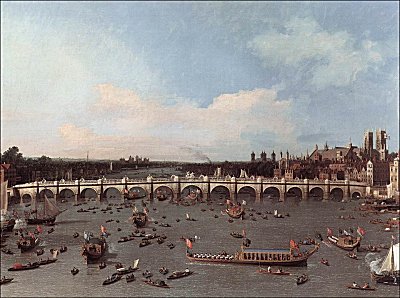
Canaletto: Westminster Bridge 1746
Uit: Bestorm mijn hart, de beste Engelse gedichten uit de 16e-19e eeuw gekozen en vertaald door Cornelis W. Schoneveld, tweetalige editie. Rainbow Essentials no. 55, Uitgeverij Maarten Muntinga, Amsterdam, 2008, 296 pp, € 9,95 ISBN: 9789041740588
Bestorm mijn hart bevat een dwarsdoorsnede van vier eeuwen lyrische Engelse dichtkunst. Dichters uit de zestiende tot en met de negentiende eeuw dichter onder andere over liefde, natuur, dood en religie. Niet alleen de Nederlandse vertaling is in deze bundel te vinden, maar ook de originele Engelse versie. Deze prachtige bloemlezing, met gedichten van onder anderen Shakespeare, Milton, Pope en Wordsworth, is samengesteld en vertaald door Cornelis W. Schoneveld. Hij is vele jaren docent historische Engelse letterkunde en vertaalwetenschapper aan de Universiteit van Leiden geweest.
kempis.nl poetry magazine
More in: London Poems, Wordsworth, Wordsworth, William

William Shakespeare: Sonnet 87
nieuwe vertaling Cornelis W. Schoneveld
Sonnet 87
Farewell! thou art too dear for my possessing,
And like enough thou know’st thy estimate,
The charter of thy worth gives thee releasing:
My bonds in thee are all determinate.
For how do I hold thee but by thy granting,
And for that riches where is my deserving?
The cause of this fair gift in me is wanting,
And so my patent back again is swerving.
Thy self thou gav’st, thy own worth then not knowing,
Or me to whom thou gav’st it, else mistaking,
So thy great gift upon misprision growing,
Comes home again, on better judgement making.
Thus have I had thee as a dream doth flatter,
In sleep a king, but waking no such matter.
Sonnet 87
Vaarwel, jij bent als mijn bezit te kostbaar,
En vast is jou je opbrengst wel bekend,
Het handvest van je waarde is opzegbaar:
Geen van mijn claims op jou wordt nog erkend.
Want hoe houd ik je vast als jij ‘t niet toestaat,
En waar is mijn verdienste voor die weelde?
Ik mis de aanspraak op die schone weldaad,
En zo vervalt ‘t gebruiksrecht dat ik deelde.
Jij gaf jezelf, onkundig van je waarde,
Of met van mij een drogbeeld, bij die schenking;
Jouw grote gift, die valse winst vergaarde,
Komt dus retour, na betere bedenking.
‘t Bezit van jou was zo, als wat een droom biedt,
Slapend een koning, wakker in ‘t geheel niet.
Cornelis W. Schoneveld poetry in translation
kempis.nl poetry magazine
More in: -Shakespeare Sonnets, Archive S-T, Shakespeare
Thank you for reading Fleurs du Mal - magazine for art & literature